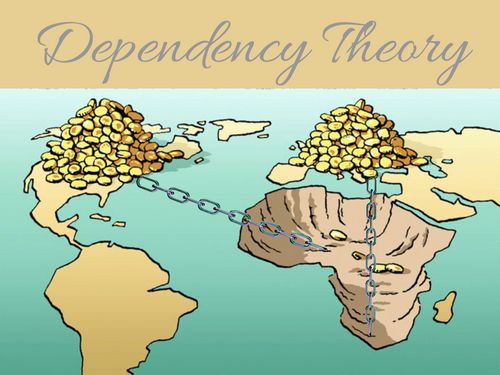Is colonial baggage halting development? Dependency theory in a nutshell
Jan 07, 2022 · 2 mins read
0
Share

In response to liberal modernization theory (see my Memo below) which suggests the same linear method of development to all countries, some leftist scholars from Latin America created an alternate model of development which factored in the power dynamics between states.
Save
Share
Dependency theory expanded upon Lenin’s claim of imperialism being the highest stage of capitalism. It holds that the dependency created during the colonial era continued into the post-colonial phase in the form of economic neocolonialism, for example in the form of foreign aid.
Save
Share
The former colonial masters continued to be the core of an integrated international system as resources flowed from the previously colonized areas (periphery) to the core, and commodities moved the other way. Thus, the core is enriched at the expense of the periphery.
Save
Share
Unlike W.W. Rostow’s focus on internal barriers to development, dependency scholars like Andre Gunder Frank looked at hurdles at the international level which made periphery countries dependent on the core for skewed development.
Save
Share
Raul Prebisch and Hans Singer argued that as primary products are relatively inelastic compared to manufacturing goods - the price of the former doesn’t increase as rapidly as that of the latter - the periphery faces declining terms of trade.
Save
Share
Immanuel Wallerstein’s World-systems theory put the theory in historical perspective. The present system emerged in 16th century Europe, driven by capitalism. Wallerstein also incorporated semi-periphery countries which stabilized the system by providing cheap skilled labor.
Save
Share
The present system was set up through colonialism which destroyed formerly self-sufficient economies and attached them to a relationship of unequal exchange and exploitation, upheld through the core’s economic, military and technological superiority.
Save
Share
Dependency theory inspired policies such as import substitution industrialization and leaders such as Hugo Chavez. Failure of its applicability has been attributed by some to Cold War politics in which leftist governments were undermined through American involvement.
Save
Share
But supporters neglect the role of poor governance in the underdevelopment of the Global South. Many despots have used neocolonialism to gloss over their incompetencies. Dependency theory policies have at times decreased competition while increasing domestic opportunity cost.
Save
Share
Bottom Line. Dependency theory gives a non-Western perspective to development, showing the pervading effects of colonialism. But to what extent is the dependency due to the core’s exploitation, and to what extent is it the periphery’s shortcomings?
Save
Share
0